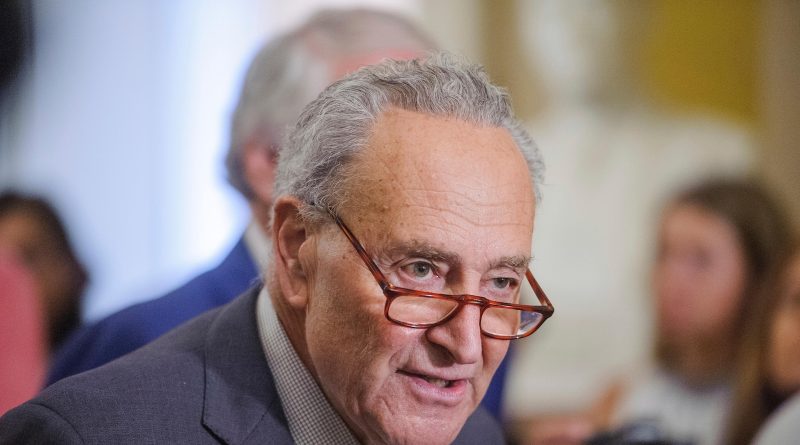Senate Democrats prepare to vote on child tax credit as part of campaign strategy to appeal to families in election year
WASHINGTON — Democratic Senate Leader Chuck Schumer is challenging Republicans to vote against a bipartisan tax cut package aimed at broadening the child tax credit for millions of families and reinstating some business tax breaks.
And Republicans seem ready to do just that on Thursday, with many arguing they will have more power to enact the tax changes they desire if their party wins control of the White House and both chambers of Congress in November’s election. Large portions of the tax cut package approved under Republican control in 2017 are set to expire after 2025, pushing tax matters to the forefront.
“I believe we can improve next year,” said Sen. John Cornyn, R-Texas.
It’s anticipated to be the final vote senators will cast before heading home for the August recess, and highlights how both parties are trying to emphasize issues they feel will resonate with voters in November. Democrats are also seeking to counter claims from Donald Trump’s running mate, Sen. JD Vance of Ohio, that Democrats are “anti-family.”
“The American people will have an opportunity to see which senators actually support tax relief for parents and businesses and housing, and who is against it,” Schumer said.
The approximately $79 billion package passed the House overwhelmingly in January, 357-70. But it has stalled in the Senate. The procedural vote to advance the measure will require backing from 60 senators, which is improbable.
The bill was crafted through negotiations by Rep. Jason Smith, the Republican chairman of the House Ways and Means Committee, and Sen. Ron Wyden, the Democratic chairman of the Senate Finance Committee. It would restore full, immediate deductions that businesses can take for the purchase of new equipment and machinery, and for domestic research and development expenses. It also would help more low-income families make fuller use of the child tax credit.
The modifications to the child tax credit could lift as many as 500,000 out of poverty when the proposal is fully in effect, according to the Center on Budget and Policy Priorities. In total, the families of about 16 million children would benefit, the progressive think tank said.
The bill is funded by expediting the cut-off date by which companies could submit retroactive claims for employees they retained on the payrolls during the COVID pandemic. The IRS has indicated that a significant majority of retroactive claims are at a high risk of fraud.
With the bill seemingly lacking the support necessary to overcome procedural obstacles, Schumer had chosen for months not to bring it up for a vote. But election season has provided an opportunity for Democrats to focus on the issue as well as shine a light on Vance. Schumer even mentioned “the junior senator from Ohio” when addressing the Senate, leaving no doubt he’s part of their considerations in holding the vote.
Vance alleged in a Fox News interview that Vice President Kamala Harris was advocating for an end to the child tax credit. But the Biden administration spearheaded the effort to strengthen the child tax credit during the pandemic and fought unsuccessfully to continue the expansion, which temporarily raised the credit to $3,000 a year, included 17-year-olds, and increased the amount to $3,600 for children under six years old.
Schumer dismissed Vance’s claim as “plain old nonsense” and stated that the 2021 expansion was one of the most significant accomplishments Democrats have achieved under the Biden-Harris administration.
Vance also insinuated in 2021 that political leaders who didn’t have biological children “don’t truly have a direct stake” in the country. He reiterated those remarks after clips of the comments resurfaced by saying earlier this week on the SiriusXM radio program “The Megyn Kelly Show” that the Democratic Party had become “anti-family and anti-child.”
“The Republicans have been delivering big speeches about how they are pro-family and pro-kids, and they repeat it over and over. But when the time comes for a vote, they’re AWOL,” Wyden said. “Now, they are going to get the vote, and we’re going to be able to see who is going to be there for the kids and the families.”
Democratic Sens. Sherrod Brown of Ohio and Bob Casey of Pennsylvania, both in competitive races this autumn, spoke at length on the Senate floor in favor of the bill. But Cornyn, the Texas Republican, referred to Thursday’s action as the latest in a series of “show votes” designed to fail but would give Democrats “with a talking point or two on the campaign trail.” He said the bill should have been the subject of a Senate committee hearing that would enable lawmakers to shape it before it reached the floor.
Sen. John Thune, the second-ranking Senate Republican, said he anticipates a few Republicans to vote for the measure, but he predicted that it would not be adequate to meet the 60-vote threshold needed to advance the bill. He said there are positive aspects in the legislation, but “if we’re in a position to do this next year, it will be a much stronger bill.”
Thune said it won’t be difficult for Republicans to reject criticism that they were not sufficiently supportive of tax relief for businesses and families.
“There are certain issues that voters instinctively know that Republicans are better on,” Thune said. “They may try to make that argument in a political ad, but I think it’ll be hard to sustain when most voters know that it was the Republicans in 2017 that cut taxes and that next year it will be Republicans who extend those tax cuts if we have the majority.”

